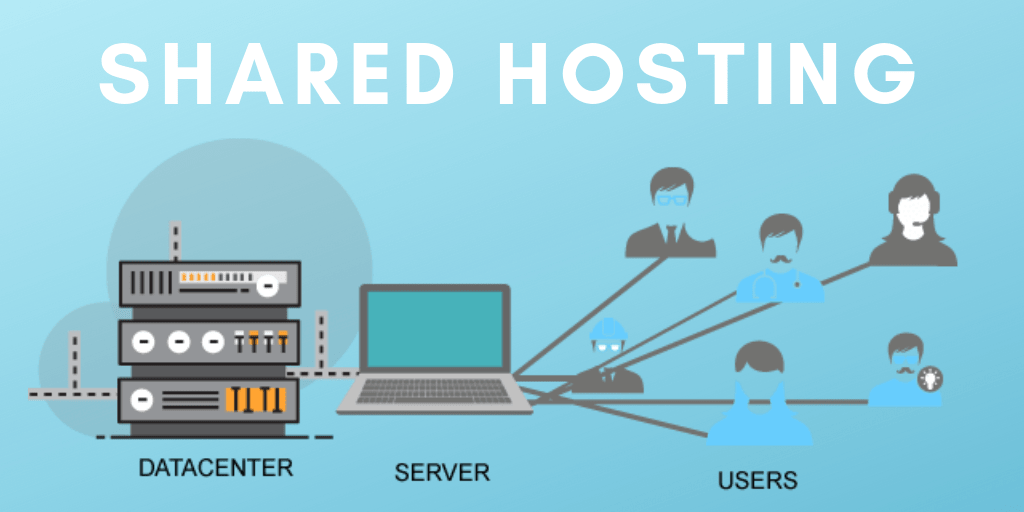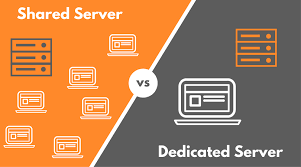What is Shared Hosting?

Shared hosting is a type of web hosting service where multiple websites share the same physical server and its resources, such as CPU, RAM, and disk space. This is a cost-effective hosting solution where the overall cost of server maintenance is distributed among the users who share the server. Each user has their own account and is allocated a certain amount of resources for their website.
Table of Contents
Shared Hosting and Dedicated Hosting

Choosing between shared hosting and dedicated hosting depends on your specific needs, budget, and the requirements of your website or application. Let’s compare shared hosting and dedicated hosting based on various factors:
- Resource Allocation:
- Shared Hosting: Multiple websites share the same server resources, including CPU, RAM, and disk space.
- Dedicated Hosting: A single website has exclusive access to all server resources.
- Performance:
- Shared Hosting: Performance can be variable and is influenced by the activities of other websites on the same server.
- Dedicated Hosting: Offers consistent high performance since all server resources are dedicated to a single user.
- Cost:
- Shared Hosting: More cost-effective as server costs are shared among multiple users.
- Dedicated Hosting: More expensive due to exclusive access to server resources.
- Scalability:
- Shared Hosting: Limited scalability as resources are shared. Upgrading may involve moving to a higher shared hosting plan or switching to a different hosting type.
- Dedicated Hosting: Highly scalable, allowing easy upgrades to accommodate growing needs.
- Control and Customization:
- Shared Hosting: Limited control over server settings and configurations. Users need to adhere to the hosting provider’s settings.
- Dedicated Hosting: Full control over server settings, allowing for greater customization based on specific requirements.
Who uses shared hosting?

Shared hosting is ideal for website owners looking for a beginner friendly, and cost-effective option. Personal projects, small businesses, and even medium sized businesses can benefit from the advantages of shared hosting. The disadvantages are inconsequential as long as website traffic isn’t too heavy, and the server is protected by reliable security protocols.
When websites do outgrow the resources allotted in shared hosting situations, there are other hosting plans ready to take over. Migrating a website from one hosting environment to another is an easy process and does not detract from your site’s efficiency.
Pros of shared hosting
The advantages of shared hosting are:
- Low costs
- Low technical skills required
A huge factor influencing the use of shared hosting is its low cost. A single server’s maintenance costs can be distributed amongst its many users, driving down individual costs to customers. You also have the option to pay more to upgrade to hosting services that allow more traffic, and greater resources.
Many people first launch their websites with shared hosting because it requires little technical skill, or in-depth knowledge of servers. Shared hosting plans come with a control panel to facilitate website management, and pre-installed programs to accommodate most general websites. Server maintenance, like installing updates and patches, is carried out by the host providers, so all you have to worry about is developing your business.
Cons of shared hosting
The disadvantages of shared hosting are:
- Shared server resources
- Higher security risks
Shared hosting is great for new websites that require basic resources and expect low to moderate traffic. However, shared hosting does have its limitations. The most obvious limitation is the collective sharing of processing power, memory, disk space, and all other resources housed on a server.
A consequence of sharing server resources is the possibility of the “bad neighbor effect.” This is where one website on a shared server hogs resources, causing other websites on the server to slow down. However, chances of this actually causing a noticeable issue is low, since professional hosting companies provide more than enough resources to accommodate their users. They’re also efficient in moderating highly trafficked websites, and suggest growing websites move to higher hosting services that provide additional bandwidth.
Another risk associated with shared hosting is that your server’s IP address could be blacklisted if someone on the same server is sending out spam. To avoid having your emails dropped in the spam mailboxes of your recipients, make sure you choose a web hosting provider with policies against this abuse.
What is dedicated hosting?

Dedicated hosting means your website is hosted on a single server that is dedicated specifically to your website. This cuts out the competition of resources associated with shared hosting, and results in more robust website performance.
If shared hosting is like a public bus, then dedicated hosting is like renting your own car. You have more control where you take your car, how fast it goes, and what radio station plays. However, it also comes at a much higher cost, and requires more knowledge in order to maintain it. Dedicated hosting has very similar advantages and disadvantages.
Pros of dedicated hosting plans
The advantages of dedicated hosting are:
- Total utilization of server resources
- Ability to customize
With a dedicated hosting solution, there is no server sharing involved which means no bad neighbor effects. All your server’s processing power, memory, and disk space can be committed to your website. In addition, no other user could expose your website to cyber threats or cause your server’s IP address to be blacklisted.
Dedicated hosting allows extensive customization, giving you the ability to optimize your server settings. It also gives you root access so that you can modify software code. Server configuration is generally valued when a website requires a special application.
Cons of dedicated hosting
The disadvantages of dedicated hosting are:
- Very high costs
- Requirement of technical knowledge
- More labored maintenance
It comes as no surprise that greater resources and control come at a greater cost. Renting dedicated servers can run between $60 and $350+ per month, depending on how involved the hosting provider is with maintenance and security. Usually a website that garners the traffic requiring dedicated server resources is profitable enough to afford dedicated hosting.
Another limitation of a dedicated hosting solution is that it requires a high level of technical knowledge, especially if you want to take advantage of the customizability. If technology isn’t your specialty, you could hire a server admin, or purchase a plan that includes management support, however, these add to your costs.
If want to buy a best hosting: Shared Hosting and Dedicated Hosting